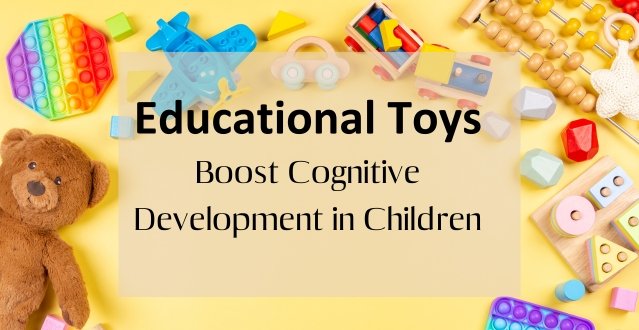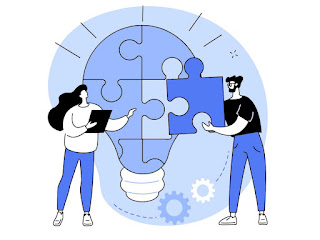All parents aspire for their children to flourish and excel in their lives, and a crucial factor in achieving this is building a solid base in cognitive development.
Cognitive development is the process by which a child learns to reason, think, and remember. It is an important part of a child's growth, as it lays the groundwork for future learning and success. Heather Grocott of The Children's Workshop emphasizes the significance of cognitive development in young children, stating that kids under the age of three create an astounding 700 to 1,000 neural connections per second. As we age, our brain's ability to adapt to change decreases, making the first few years of a child's life crucial for their overall development and future success.
One way to support your child's cognitive development is through the use of educational toys. Educational toys are designed to help children learn and develop new skills while they play.
In this article, we will explore the benefits of educational toys for cognitive development and offer tips for selecting the best educational toys for your child.
Benefits of Educational Toys for Cognitive Development
1. Improved Problem-Solving Skills
Educational toys can help improve problem-solving skills in children by presenting them with challenging tasks to solve.
For example, building and construction toys, such as blocks and Legos, require children to use their problem-solving skills to figure out how to build structures and designs. As they play with these toys, children develop their ability to think critically and creatively, skills that are essential for success in all areas of life.
2. Enhanced Creativity and Imagination
Many educational toys, such as arts and crafts toys, science kits, and pretend play toys, allow children to express their creativity and imagination. Through play, children can explore their own interests and ideas, which can lead to a lifelong passion for learning and exploration.
3. Increased Attention Span and Focus
Educational toys can also help children increase their attention span and focus. When children are engaged in play, they are more likely to stay focused and attentive for longer periods of time.
For example, puzzle and problem-solving toys require children to concentrate and focus to solve the puzzle or complete the task.
4. Improved Memory Retention and Recall
Some educational toys, such as memory games and educational games, can help children improve their memory retention and recall. These games challenge children to remember information, which helps strengthen their memory muscles over time.
Improved memory retention and recall can lead to better academic performance and overall success in life.
Tips for selecting the best educational toys for cognitive development
- Consider the Child's Age and Developmental Stage
It is important to select educational toys that are appropriate for your child's age and developmental stage. Toys that are too advanced or too simplistic may not be engaging or effective for your child's cognitive development.
Take into account your child's interests and abilities, and choose toys that are challenging yet enjoyable for them.
- Look for Toys that Encourage Exploration and Creativity
Toys that encourage exploration and creativity can help enhance cognitive development in children. Look for toys that allow children to experiment and create, and that challenge them to think critically and creatively. These toys can help foster a love of learning and exploration in children.
- Choose Toys that are Interactive and Engaging
Toys that are interactive and engaging can help hold a child's attention and improve their focus and attention span. Look for toys that require children to actively participate in play, such as building sets or science kits. These toys can help improve problem-solving skills and memory retention.
- Consider the Educational Value of the Toy
When selecting educational toys for your child, consider the educational value of the toy. Look for toys that are designed to teach specific skills, such as counting or letter recognition, or that encourage learning in STEM subjects. These toys can help improve academic performance and prepare children for success in school and beyond.
- Select a toy that your child likes:
According to a study, when children have a positive emotional connection to a particular educational toy, they are more likely to engage with it and reinforce the skills they have learned. (UKEssays, 2018). So, it is important to take your child’s likeness towards a toy into consideration.
Conclusion:
In conclusion, educational toys are a valuable tool for supporting cognitive development in children. By choosing the right toys for your child, you can help improve problem-solving skills, enhance creativity and imagination, increase attention span and focus, and improve memory retention and recall.
Consider the types of educational toys that are best suited to your child's interests and developmental stage, and look for toys that encourage exploration, creativity, and engagement. With the right toys and a little bit of play, you can help set your child on the path to lifelong success.
FAQ’s
What are some examples of educational toys that can boost cognitive development in children?
Many educational toys can boost cognitive development in children such as puzzles, building blocks, board games, musical instruments, and science kits.
How can I incorporate educational toys into my child's playtime routine?
You can incorporate educational toys into your child's playtime routine by setting aside dedicated playtime for educational toys, rotating the toys regularly to keep things fresh, and getting involved in your child's play to encourage learning.
Are there any risks associated with relying too heavily on educational toys for my child's cognitive development?
While educational toys can be a great tool for cognitive development, it's important to remember that playtime should also include unstructured play and socialization with other children. Over-reliance on educational toys can limit a child's imagination and creativity.
What age range is most appropriate for using educational toys for cognitive development?
Educational toys can be beneficial for cognitive development at any age, but they are especially important for children under the age of 3 when their brains are making the most neural connections. However, children of all ages can benefit from educational toys that are appropriate for their developmental stage.
References:
UKEssays. (November 2018). Importance of Toys in Child Development. Retrieved from https://www.ukessays.com/essays/childcare/importance-toys-child-development-5342.php?vref=1










0 Comments